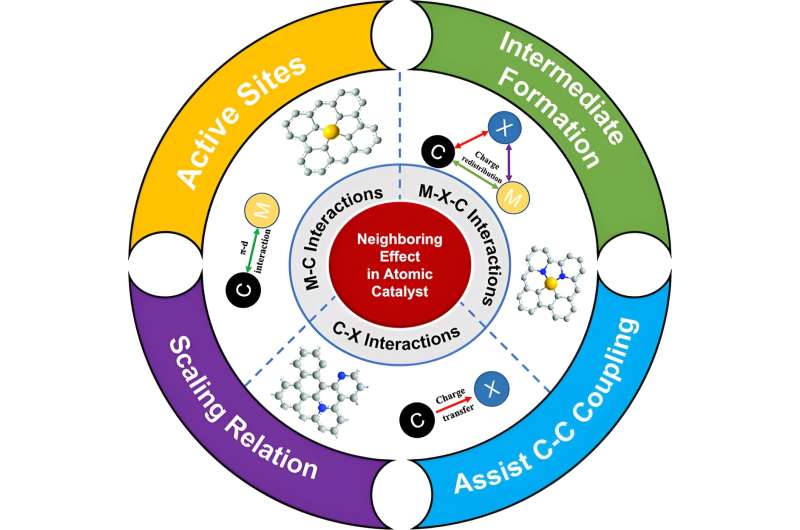This article has been reviewed according to Science X's editorial process and policies. Editors have highlighted the following attributes while ensuring the content's credibility:
fact-checked
proofread
A catalyst's best friend: How neighboring atoms boost CO₂ electrochemical reduction

Reducing carbon dioxide (CO2) into valuable chemicals is a key strategy for mitigating climate change and achieving carbon neutrality. Traditional catalysts face challenges in selectivity and efficiency. Based on these issues, it is crucial to explore new strategies to improve the performance of electrocatalysts. Due to these challenges, an in-depth study is needed to advance the field.
A team from The Hong Kong Polytechnic University, led by Bolong Huang, published a review in eScience investigating the neighboring effects in single-atom catalysts for CO2 reduction. The study highlights the importance of surrounding atoms in modulating the electronic properties of single-atom catalysts (SACs), thereby enhancing their catalytic performance.
The review summarizes various neighboring effects and their influence on the electrochemical reduction of CO2. SACs, known for their catalytic activity, benefit from the electronic modulation induced by neighboring atoms. These atoms can act as additional active sites, facilitating electron transfer and improving CO2 reduction efficiency.
The study also explores the coordination effect on single metal active sites and presents an outlook for examining neighboring effects in other electrocatalytic processes. Both theoretical and experimental evidence suggests that neighboring sites enhance SAC performance by providing secondary active locations during the catalytic process.
Dr. Bolong Huang, the senior researcher, stated, "Our findings on neighboring effects open new avenues for designing advanced single-atom catalysts. By understanding how neighboring atoms influence the catalytic process, we can develop more efficient and sustainable solutions for CO2 reduction."
This research provides valuable insights into the design of advanced SACs for efficient electrocatalysis. The improved understanding of neighboring effects could lead to the development of better catalysts for sustainable energy conversion, ultimately contributing to efforts in combating climate change and achieving carbon neutrality.
More information: Hon Ho Wong et al, Neighboring effect in single-atom catalysts for the electrochemical carbon dioxide reduction reaction, eScience (2023). DOI: 10.1016/j.esci.2023.100140
Provided by TranSpread





















